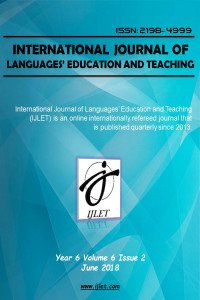Abstract
The purpose of this study employing a pre-test post-test control group research design is to investigate the impact of the intervention in brain-compatible learning principles on young adult learners’ proficiency in English. The study was carried out with the participation of 53 university preparatory students aged 18-21. So as to elucidate the influence of the brain-compatible learning intervention on participants’ English language proficiency, the participants in the experimental group attended 300 English lessons planned in accordance with brain-compatible learning principles while the control group was simultaneously taught in accord with traditional teaching methods. The results of the proficiency exam administered at the outset of the study and the one conducted at the end of the intervention were used in order to explore whether any differences regarding English language proficiency between the experimental and control group occurred following the intervention. A semi-structured interview was conducted with the experimental group participants to learn about their perceptions of the brain-compatible learning intervention. The findings obtained from the analysis of the exam results reveal that the experimental group outperformed the control group in the post-proficiency exam, which indicates that implementing brain-compatible learning principles in lessons can enable students to improve their proficiency in English more. The analysis of the responses given in the interview yields participants’ positive perceptions about the brain-compatible learning intervention.
Keywords
Brain-compatible learning young adult learners English language proficiency brain-compatible learning principles
References
- Bello, D. M. (2007). The effect of brain-based learning with teacher training in division and fractions in fifth grade students of a private school. Unpublished Doctoral Dissertation, Capella University, Minneapolis.
- Blackburn, C. A. S. (2009). The effect of brain-based instructional techniques on the reading skills of elementary school students. Unpublished Doctoral Dissertation, Walden University, Minneapolis.
- Brooks, M. G., & Brooks, J. G. (1999). The courage to be constructivist. Educational Leadership, 57(3), 18-24.
- Caine, R. N., & Caine, G. (1994). Making connections: Teaching and the human brain. New York: Innovative Learning Publications.
- Caine, R. N., & Caine, G. (2000). 12 brain/mind natural learning principles. Retrieved February 12, 2014, from http://www.cainelearning.com/wp-content/uploads/2014/04/12-Brainmind-principles-expanded.pdf.
- Çengelci, T. (2007). The effect of brain-based learning to success and retention in social studies. Elementary Education Online, 6(1), 62-75.
- Duman, B. (2010). Effects of brain-based learning on academic achievement: A sample case of in-class application. Eurasian Journal of Educational Research. 41, 91-115.
Abstract
Keywords
Brain-compatible learning young adult learners English language proficiency brain-compatible learning principles
References
- Bello, D. M. (2007). The effect of brain-based learning with teacher training in division and fractions in fifth grade students of a private school. Unpublished Doctoral Dissertation, Capella University, Minneapolis.
- Blackburn, C. A. S. (2009). The effect of brain-based instructional techniques on the reading skills of elementary school students. Unpublished Doctoral Dissertation, Walden University, Minneapolis.
- Brooks, M. G., & Brooks, J. G. (1999). The courage to be constructivist. Educational Leadership, 57(3), 18-24.
- Caine, R. N., & Caine, G. (1994). Making connections: Teaching and the human brain. New York: Innovative Learning Publications.
- Caine, R. N., & Caine, G. (2000). 12 brain/mind natural learning principles. Retrieved February 12, 2014, from http://www.cainelearning.com/wp-content/uploads/2014/04/12-Brainmind-principles-expanded.pdf.
- Çengelci, T. (2007). The effect of brain-based learning to success and retention in social studies. Elementary Education Online, 6(1), 62-75.
- Duman, B. (2010). Effects of brain-based learning on academic achievement: A sample case of in-class application. Eurasian Journal of Educational Research. 41, 91-115.
Details
| Primary Language | English |
|---|---|
| Subjects | English As A Second Language |
| Journal Section | Research Article |
| Authors | |
| Publication Date | June 30, 2018 |
| Published in Issue | Year 2018 Volume: 6 Issue: 2 |


